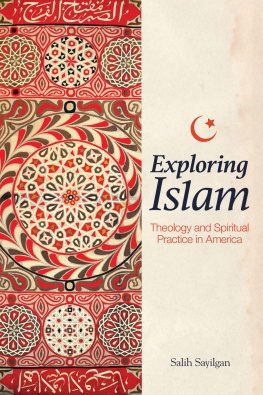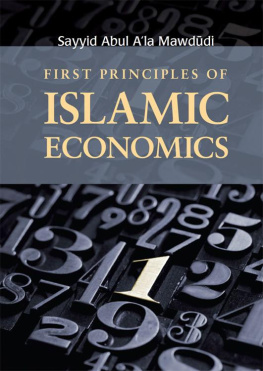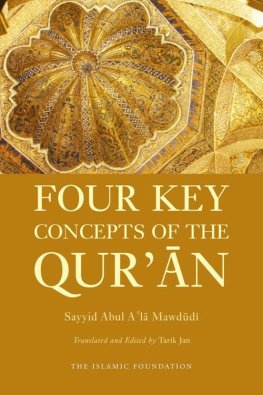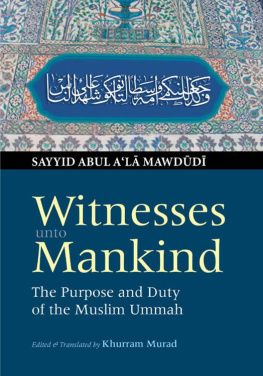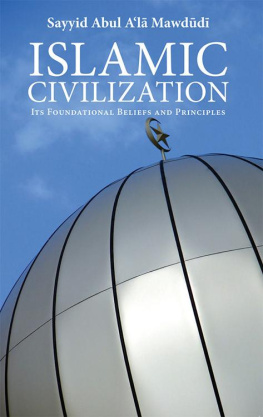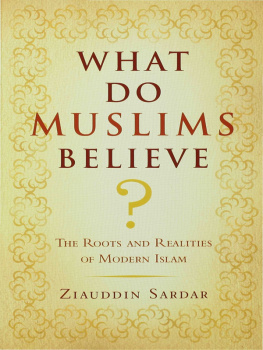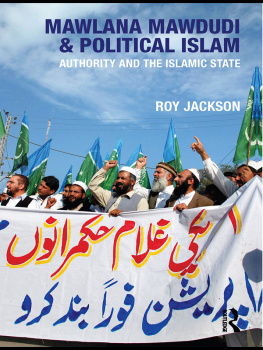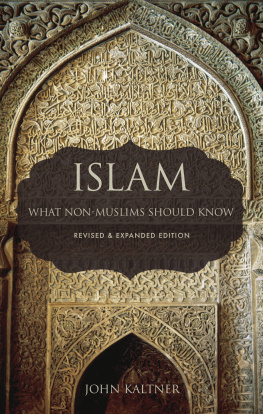Sayyid Abul ala Maududi - Let Us Be Muslims
Here you can read online Sayyid Abul ala Maududi - Let Us Be Muslims full text of the book (entire story) in english for free. Download pdf and epub, get meaning, cover and reviews about this ebook. year: 2016, publisher: Islamic Foundation;, genre: Religion. Description of the work, (preface) as well as reviews are available. Best literature library LitArk.com created for fans of good reading and offers a wide selection of genres:
Romance novel
Science fiction
Adventure
Detective
Science
History
Home and family
Prose
Art
Politics
Computer
Non-fiction
Religion
Business
Children
Humor
Choose a favorite category and find really read worthwhile books. Enjoy immersion in the world of imagination, feel the emotions of the characters or learn something new for yourself, make an fascinating discovery.

- Book:Let Us Be Muslims
- Author:
- Publisher:Islamic Foundation;
- Genre:
- Year:2016
- Rating:3 / 5
- Favourites:Add to favourites
- Your mark:
- 60
- 1
- 2
- 3
- 4
- 5
Let Us Be Muslims: summary, description and annotation
We offer to read an annotation, description, summary or preface (depends on what the author of the book "Let Us Be Muslims" wrote himself). If you haven't found the necessary information about the book — write in the comments, we will try to find it.
Let Us Be Muslims — read online for free the complete book (whole text) full work
Below is the text of the book, divided by pages. System saving the place of the last page read, allows you to conveniently read the book "Let Us Be Muslims" online for free, without having to search again every time where you left off. Put a bookmark, and you can go to the page where you finished reading at any time.
Font size:
Interval:
Bookmark:
LET US BE MUSLIMS
Sayyid Abul Ala Mawdudi
EDITED BY
K HURRAM M URAD
THE ISLAMIC FOUNDATION
Copyright The Islamic Foundation 1982/1402 H.
Reprinted 1983/1403 H; 1992/1412 H; 1996/1416 H; 2000/1420 H; 2008/1429 H, 2009/1430 H, 2011/1432H and 2016/1437H.
All rights reserved. No part of this publication may be reproduced, stored in a retrieval system, or transmitted in any form or by any means electronic, mechanical, photocopying, recording or otherwise, without the prior permission of the copyright owner.
Editor: Khurram Murad
Cover design: Nasir Cadir
Cover image: Batool al-Toma
Published by
THE ISLAMIC FOUNDATION,
Markfield Conference Centre,
Ratby Lane, Markfield, Leicestershire, LE67 9SY, UK
E-mail:
Website: www.islamic-foundation.com
Quran House, P.O. Box 30611, Nairobi, Kenya
PMB 3196, Kano, Nigeria
Distributed by: Kube Publishing
Tel: +44(1530) 249230, Fax: +44(1530) 249656
Email:
Website: www.kubepublishing.com
British Library Cataloguing in Publishing Data
Mawdudi, Abul Ala
Let us be Muslims.
1. Islam
I. Title II. Murad, Khurram
297 BP161.2
ISBN 978-0-860371-57-1

Contents
I
Sayyid Abul Ala Mawdudis Khuubt, of which Let Us Be Muslims is the new and edited English translation, is no ordinary book.
A collection of ordinary, familiar themes and plain truths, expounded before ordinary, illiterate people in plain words from their everyday language, it has, by the mercy of Allah, stirred more hearts and impelled more lives to alter their course to live in commitment to their Creator than any of his more erudite works. Many, I am sure, would share this impression of mine who like me have been led by his inspiring writings to join the cause of Allah. For who can forget those gatherings where the participants often reminisced about things that had brought them to the Islamic movement. As one person after another rose to tell his story and mentioned Sayyid Mawdudis writings, I still vividly recollect, one answer overshadowed all others: the Khuubt.
To express my own indebtedness to this book, I can do no better than to confess that I have now been reading it for nearly four decades and every time I have found it as fresh and inspiring as ever. Even today, I find myself speaking and writing, without the least embarrassment, words and ideas from the Khuubt, as if they were my own.
How did this book come into being? As Sayyid Mawdudi tells in his Preface, soon after migrating to Darul Islam, near Pathankot (now in the Punjab, India) on 16 March, 1938 he started to gather the nearby villagers for the Friday Prayers. To them, in every congregational address (Khuubah), he tried to explain the essential message, the basic teachings, and the spirit of Islam. Those addresses were collected and published as Khuubt.
First published in 1940, since then it has been published in various forms and languages. A popular series has been that of six separate booklets Haqiqat-i-Iman, Haqiqat-i-Islam, Haqiqat-i-Sawm-o-Salat, Haqiqat-i-Zakat, Haqiqat-i-Hajj, Haqiqat-i-Jihad. Translations in Bengali, Hindi, Tamil, Malayalam, Gujrati, Telgu, Sindi, Pushto and many other subcontinental languages have also been made and published since the early 1950s. The English translation came out thirty-five years later under the title The Fundamentals of Islam (Islamic Publications, Lahore, 1975). In all these different forms and languages, it has gone through innumerable reprints and is being constantly reprinted from many places. Many organizations, even individual admirers, have published its parts for mass distribution. Yet its need remains as fresh and its demand as high as ever.
Sayyid Mawdudis impact on the contemporary Muslim world is not to be measured by the sale of his books, great as they have been. It is doubtful if any other Muslim writer of our day has so many readers, or is so avidly read, but what is important is that his sincere, convincing and passionate voice has left indelible imprints on the minds and lives of his readers. The real measure of his impact, therefore, is the emergence of whole new generations of men and women who have been inspired by him to lead lives of meaningful faith, Iman, in Allah, His Messenger, and His Book, and of dedicated struggle, Jihad, in His cause. No doubt his example in launching and leading a major Islamic movement has played a crucial role in this process, but it is his writings which have made a greater impression, deep and lasting, far and wide.
Of all those writings, Sayyid Mawdudis words in Khuubt, though spoken in the narrow confines of a mosque in a far-flung part of the world, have exercised an influence very far and beyond the time and place in which they were first spoken. They have found a response in the hearts and minds of their readers in true proportion to the sincerity and depth of his message and purpose. They have led many to recognize their inner inconsistencies and make their faith and commitment sincere.
Here, in Let Us Be Muslims, then, are the words which have touched many hearts and evoked many responses. What fills them with life and power? What makes this book extraordinary?
For, on the face of it, what Sayyid Mawdudi has said in these addresses is very ordinary and commonplace; indeed so ordinary that many readers might, after one quick look, want to put the book away, without reading any further. Is this not the same stuff, they would say, which we hear, day in day out, from our pulpits? Obey Allah and His Messenger, pray and fast, and everything is going to be alright.
To such readers I would say: let us together explore, at some length, what Let Us Be Muslims means to say.
Read the book, and you will find that even ordinary things, once placed in Sayyid Mawdudis discourse, acquire quite an extraordinary quality, or, at least, in our time, that quality has become extraordinary. This is because he makes those words breathe the same sense and purpose, as against their merely lexical or cultural meanings, which they are given in the Qurn. Thus moulded afresh by the Quranic message and burnt in the crucible of his heart, the very things which look so lifeless and irrelevant to life, such as Iman and Islam and the five pillars, acquire a life and revolutionary ardour that they must have had when they were originally proclaimed and instituted. Then, the placid world of our beliefs and practices which we had always taken for granted begins to tumble down. Then, we begin to find the will and courage to be Muslims.
Equally extraordinary is his style, the way he says these things.
Sayyid Mawdudi was not the traditional preacher. His voice did not roar in the air, nor did his body shake on the pulpit. He did not employ racy anecdotes, nor did he chant poetry. Yet his voice, in this book, has the quality which makes it rise from the lifeless, printed pages and penetrate our hearts.
Let us examine more closely, then, both his direct but powerful style and simple but profound message that make this book one of his best.
II
What gives Sayyid Mawdudis voice the quality that makes it penetrating and irresistible? How does it acquire the power to quicken hearts and galvanize lives?
Obviously the primary force is the nature of his message, its truth and simplicity, and his sincerity and passionate conviction of its relevance to real life. But, no less important is the manner in which he communicates his message. The secret of his persuasive power therefore lies simply in that he has something important and urgent to say and he says it sincerely, clearly and passionately.
Next pageFont size:
Interval:
Bookmark:
Similar books «Let Us Be Muslims»
Look at similar books to Let Us Be Muslims. We have selected literature similar in name and meaning in the hope of providing readers with more options to find new, interesting, not yet read works.
Discussion, reviews of the book Let Us Be Muslims and just readers' own opinions. Leave your comments, write what you think about the work, its meaning or the main characters. Specify what exactly you liked and what you didn't like, and why you think so.

